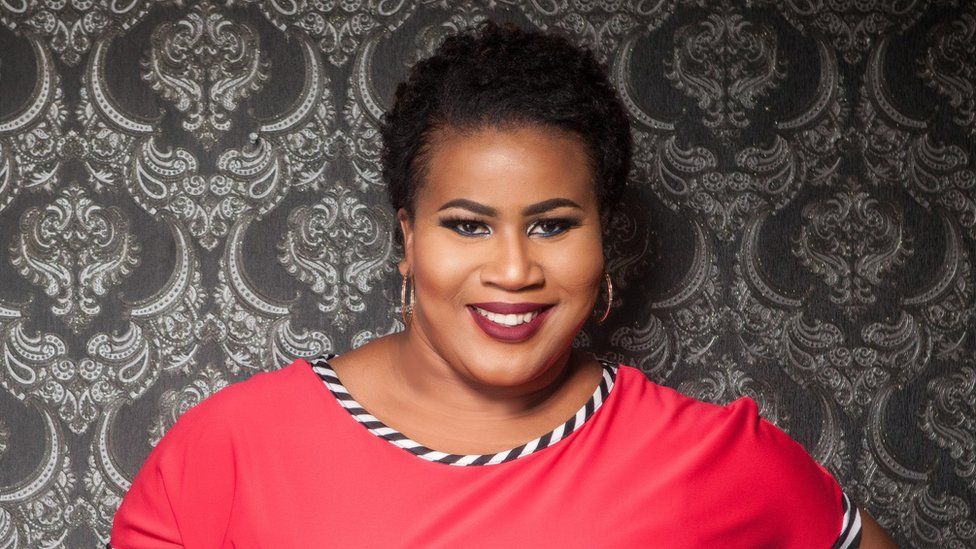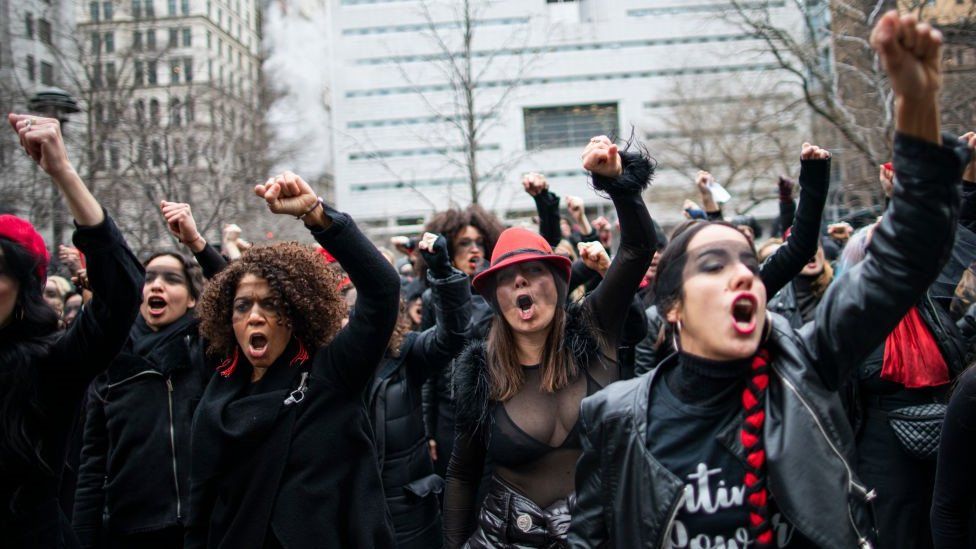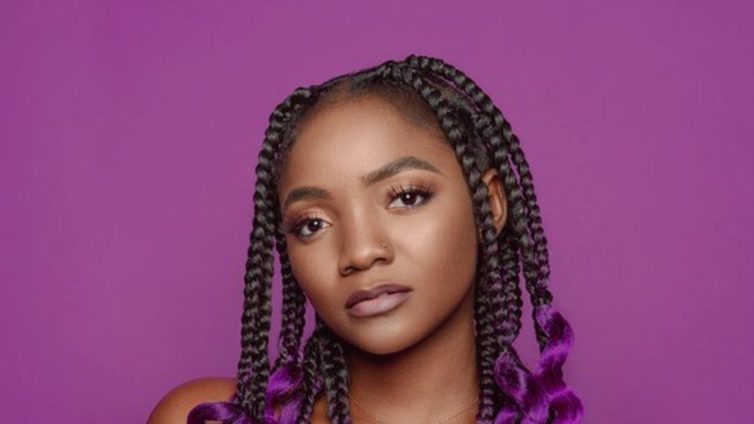
Audio By Carbonatix
Nigerian celebrities have recently opened up publicly about the sexism they have faced after multi-award-winning singer Simi spearheaded the #NobodyLikeWoman trend on Instagram.
It provided a safe space for stars, and other women, to share their experiences of discrimination.
They tended to post black-and-white photos of themselves, scrawled over with the words of their critics, like: "She's a mother, she should stay at home", "Why is she going out at night if she's not a prostitute?" and "Why aren't you married yet?"
Simi told the BBC she cried as she scrolled past one of the hash-tagged posts on her social media feed.
It was about a woman who had been mocked for having four Caesarean sections - when a baby is delivered by making a surgical cut into the abdomen and womb.
People questioned why she could not give birth naturally.
She said the comments were harsh: "'She's not any good. Imagine she cannot even have your children naturally. They had to do C-section for her and she still lost one of her children.' That is so traumatising."
The 33-year-old singer said she wanted to start the campaign so women would understand they were "not alone" in their struggles - it coincided with the release of her new song Woman.
But the flood of women who jumped on the hashtag to share their experiences of sexism and discrimination both in their careers and personal lives was a surprise.
A photo of Simi with the words: "How can she ask for that kind of money, is she not pregnant?" painted on her back started it all rolling.
As a famous artist in Africa and beyond, Simi said it summed up the sexism she had faced within her own industry of Afro music.
At the start of her career music bosses - usually men - told her she had to be "sexy" and provocative to make it in her field.
She ignored them.
When she made it big anyway, they were shocked.
There were even people who did not want to work with women, because they thought they could not function after having children or getting married, she said.
In one incident she recalled how someone questioned why she charged so much for concert tickets while she was pregnant.
"It was probably an agency," she said, when asked who the culprit was.
'Sleep with me to become a star'
Nollywood actress Chioma Omeruah - famously known as Chigul - has witnessed similar struggles and believes the problem is cultural.
"Our culture is not to speak out," the 45-year-old star told the BBC.

She took part in #NobodyLikeWoman with a photo along with the caption: "My friend! Go and have a child."
Chigul does not have any children, but that has not stopped friends and even trolls asking when she is going to have a baby.
Those close to her may have meant well, but it still hurt, she said.
During her career, Chigul said she has had countless numbers of up-and-coming actresses confide in her about alleged sexual misbehaviour by powerful male film bosses.
Some of them were told by the male directors: "Come and sleep with me, I'll make you a star. I can get you that part, that role" - which she says amounts to coercion.
One actress she knows who refused to engage in sexual relations with a male film boss was reprimanded, she said.
He called her a "child" with little understanding of "adult" business.
When asked how many young actresses had confided in her about sexual coercion, she said it was "too many".
The odds were stacked against women - the majority of the time they became the victims, she said.
"It's just wahala [trouble] on every level," she said.
Both Chigul and Simi agree that the laws in Nigeria need to be tougher on those who discriminate against or attack women.
According to UN Women, Nigeria has implemented 75% of laws needed to advance gender equality - which the UN wants to achieve worldwide by 2030.
But less than half the measures needed to monitor the country's progress towards that goal were in place by last year - for example the collection of regular statistics on things like the gender pay gap and physical and sexual harassment.
Justifying abuse with the Bible
Nigerian women's rights lawyer and YouTube vlogger Sotonye Kelechi-Nwuzi says religion is often to blame.
In her opinion, Nigeran lawmakers tend to take into account how different faith communities will react to gender equality legislation.
Mrs Kelechi-Nwuzi, who is a Christian herself, says this is problematic.
"If there's a way to separate secular society from religious and cultural society I feel like there will be some progress," she told the BBC.

She also places some of the blame at the feet of the Nigerian police.
Most of the cases Mrs Kelechi-Nwuzi covers as part of her women's rights work involve domestic violence, which the authorities do not take seriously, she says.
"Often times you'll find people quoting the Bible" in an attempt to justify a husband's violence towards his wife, she says.
#NobodyLikeWoman posts tend to be tame compared to the #MeToo movement which swept the world a few years ago when women - especially in Hollywood - started naming those who had allegedly sexually abused them.
Mrs Kelechi-Nwuzi says there could be a #MeToo movement in Nigeria one day, but it would require a woman to lead it who could withstand the vitriol and "backlash" that would come with it.
However, Simi believes the fight for women's rights in Africa cannot be compared with efforts in the West.
The situation for women in Africa is much worse because of what she describes as its patriarchal system: "It expects the woman to cower and to absorb oppression."
Chigul agrees - given that she says Nigerian women are taught to "sweep things under the rug".
Latest Stories
-
Police arrest suspect for unlawful possession and attempted sale of firearm
1 hour -
3 arrested in connection with Tema robberies
1 hour -
Your mouth on weed is nothing to smile about
1 hour -
25% university fees hike, what was the plan all along? — Kristy Sakyi queries
3 hours -
Some OMCs reduce fuel prices; petrol going for GH¢10.86, diesel GH¢11.96
3 hours -
Trump says health is ‘perfect’ amid ageing concerns
4 hours -
China’s BYD set to overtake Tesla as world’s top EV seller
4 hours -
Joy FM’s iconic 90’s Jam returns tonight: Bigger, better, and packed with nostalgia
5 hours -
Uproar as UG fees skyrocket by over 25% for 2025/2026 academic year
6 hours -
Japan PM joins fight for more female toilets in parliament
7 hours -
Ga Mantse declares war on fishing industry child labour
7 hours -
Adom FM’s ‘Strictly Highlife’ lights up La Palm with rhythm and nostalgia in unforgettable experience
8 hours -
OMCs slash fuel prices as cedi gains
9 hours -
Around 40 dead in Swiss ski resort bar fire, police say
10 hours -
AFCON 2025: Aubameyang and Nsue make history among oldest goalscorers
11 hours

